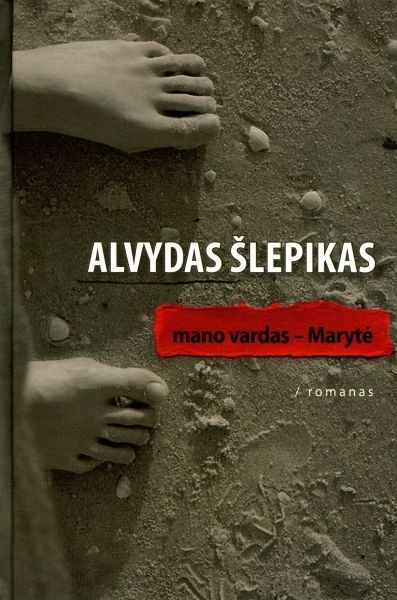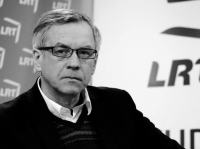Fragments from the past appear as if coming out of the darkness, like the play of shadows and light, like a black and white film.
The year is 1946.
It is winter.
A cold and grim post-war winter, full of horror.
The bridge hangs between heaven and earth above the frozen Nemunas River. The wind carries flakes of snow like down some highway. In some places the ice lies dark as white as if it were marble. It is cold, more than twenty below Celsius.
There are many metal constructions here. They criss-cross like some strange type of net, and the wind whistles through the gaps. The bridge is metal, solid, howling and singing the songs of the winds.
Blending with the wind, we hear a strange, eastern, soldier’s song.
Through the bridge’s metal, in the distance, some sort of small, dark, moving dots can be seen.
Hanging from the bridge there are posters, adverts, newspapers, proclaiming victory, encouraging people to show no mercy, to go ahead and murder. They warn about the necessity of having a licens
...
Fragments from the past appear as if coming out of the darkness, like the play of shadows and light, like a black and white film.
The year is 1946.
It is winter.
A cold and grim post-war winter, full of horror.
The bridge hangs between heaven and earth above the frozen Nemunas River. The wind carries flakes of snow like down some highway. In some places the ice lies dark as white as if it were marble. It is cold, more than twenty below Celsius.
There are many metal constructions here. They criss-cross like some strange type of net, and the wind whistles through the gaps. The bridge is metal, solid, howling and singing the songs of the winds.
Blending with the wind, we hear a strange, eastern, soldier’s song.
Through the bridge’s metal, in the distance, some sort of small, dark, moving dots can be seen.
Hanging from the bridge there are posters, adverts, newspapers, proclaiming victory, encouraging people to show no mercy, to go ahead and murder. They warn about the necessity of having a license from the military leadership.
One of the posters is torn at its edge. It quivers in the wind. The mournful song grows louder.
On the bridge there are two sentries: one is the singing Asian, the other is a Russian. The Russian is trying to light a hand-rolled cigarette, but the wind extinguishes his matches. He is angry. He is also annoyed by the Asian’s singing.
The dark little dots on the other bank now move closer—they are children of the Germans, trying to cross the frozen Nemunas River. There are about seven of them …
The Russian can’t take it anymore:
‘Fuck, shut it, China-man.’
The Asian smiles to himself. He stays quiet for a while, then mutters under his breath: ‘China-man, China-man, you’re the China-man.’
The wind is howling, and his homeland is far away. His cigarette comes apart, the match breaks in his hand, numb from the cold.
The Asian breaks into laughter:
‘Hey, Ivan …’
‘My name isn’t Ivan, it’s Yevgeny, Geny for short.’
‘Look, Ivan, little German to run …’
The German children run across the ice like partridges. A few of the smaller ones lag behind.
The Russian soldier shouts at them: ‘Stop, back, stop, obey the command, stop you Fascist pigs!’ But the bridge is high. The guard’s voice is lost in the wind. The children continue to run. They see the soldier gesticulating on the bridge, but they do not understand his words.
‘Hey, Ivan …’
‘I’m not Ivan, you China-man …’
‘They dick you over, Ivan.’
‘I’ll kill you …’
‘Calm down, you fool …’
The Russian pulls out a grenade, releases the pin, and throws it at the group of children. The two soldiers duck, hiding from the shrapnel sent flying by the powerful explosion.
The smoke from the explosion subsides. A child struggles to climb out of the hole in the ice made by the explosion. It is cold, and steam rises from the water. The other children run back, doing their best to outrun death.
When the explosion subsides, in the absolute silence, a strange sound is heard, reminiscent of the sound an animal makes before it dies. It is a high-pitched, endless sound. The other child, heavily injured, spins around awkwardly on his back, aiming to get a grip on the ice with his legs. The sound is coming from him. As he spins red blood flows from underneath his body, painting a bigger and bigger circle of red on the ice. A coloured splotch in a black and white world.
A terrified tot of maybe six stands between the wounded boy and the boy struggling to climb out of the hole in the ice. He looks as though he were made of stone. He is rendered immobile by the wounded boy’s piercing howl. There is terror in his eyes.
We will recognize this boy later. He is the young Hansel.
The Asian lifts his rifle, takes aim, and fires. The howling ceases and the wounded boy stops moving.
The noise brings Hansel back from his stupor and he runs, screaming something as he goes. But he doesn’t run back to the shore, but over the ice further down the river. A few gunshots follow him, but Hansel continues to run anyway.
After missing his shot, the Asian soldier shakes his head.
The boy struggles with the last of his strength in the hole in the ice.
The Russian soldier spits, and watches the small child barely struggling in the river.
The child’s head goes under water, but his hand still clutches the icy edge of the hole. Finally, it too disappears into mixture of snow and ice.
The Russian soldier finally lights his rolled cigarette.
The wind whistles.
Again the sad, wild song is heard.

